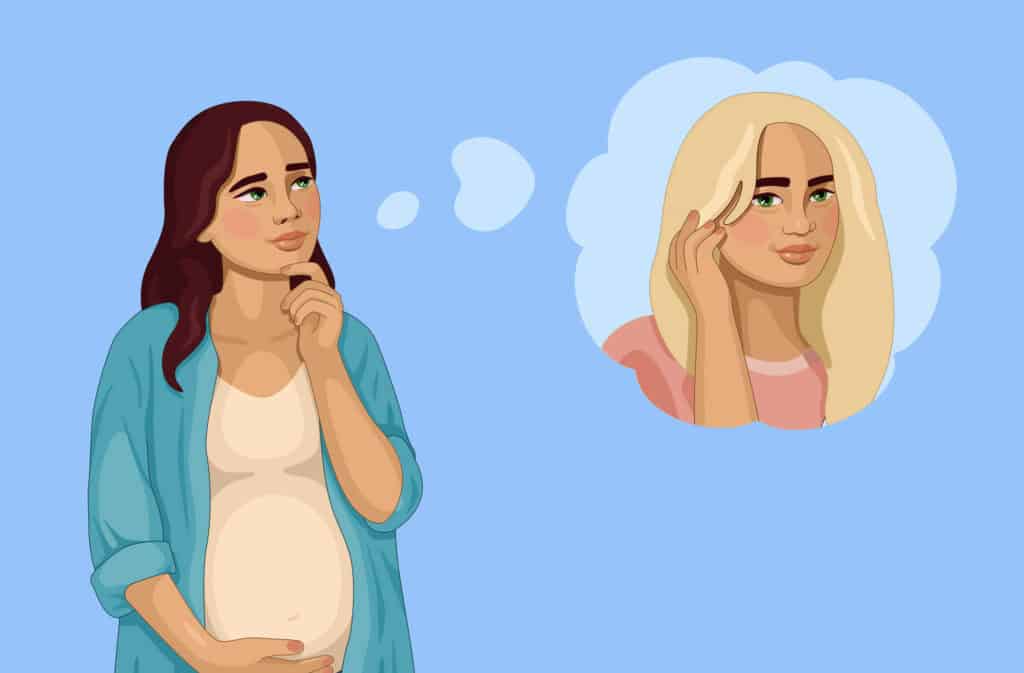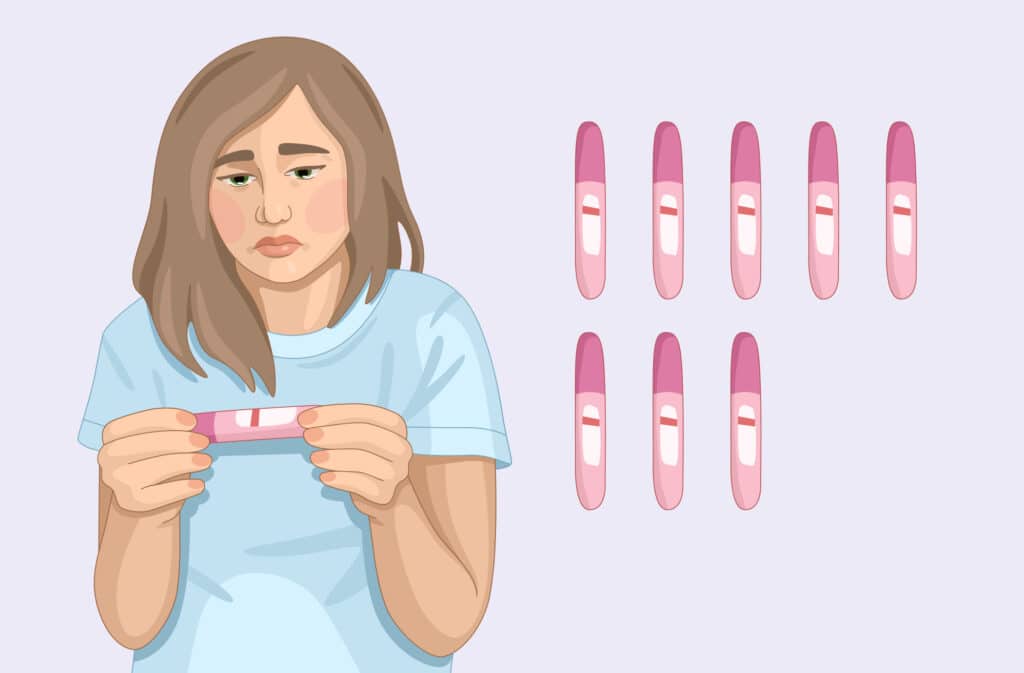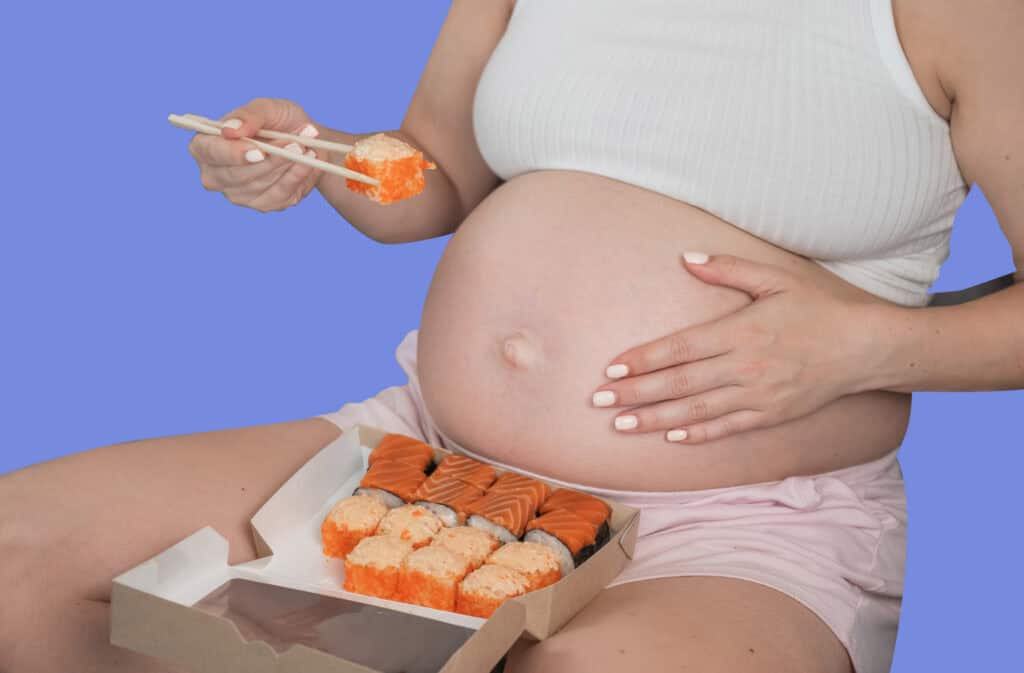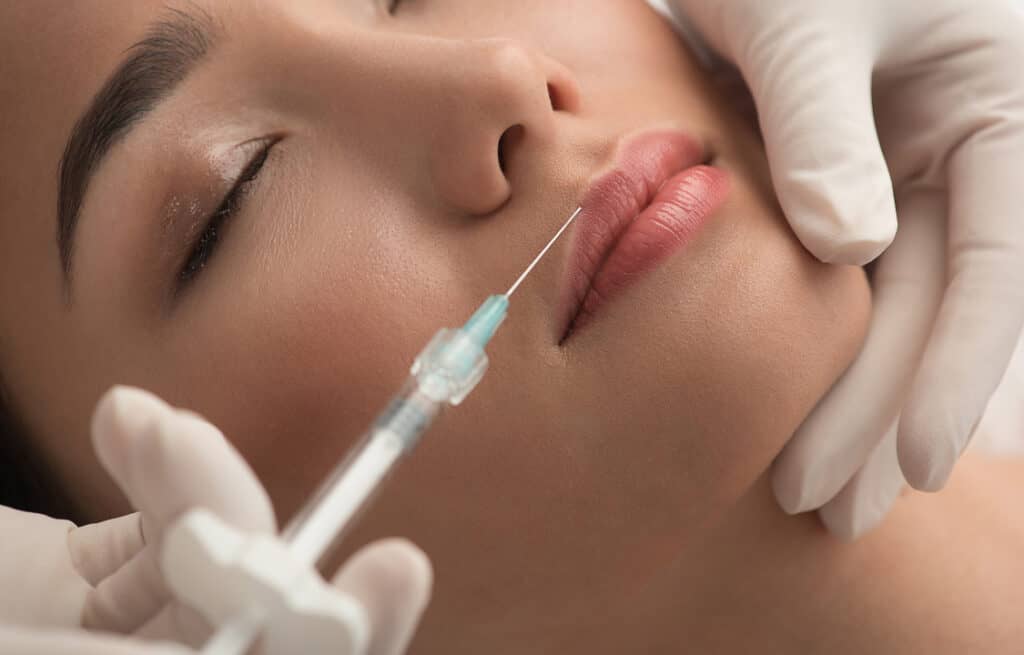Femia > Health Library > Pregnancy > Pregnancy health > Can you dye your hair while pregnant? What you need to know
Can you dye your hair while pregnant? What you need to know

- Updated Feb 11, 2025
- Published
CRAFTED BY HUMAN
Crafted by human At Femia, we provide accurate and up-to-date information at every stage of your journey, from trying to conceive, pregnancy and postnatal support. All content is created by a real person based on in-depth research and own professional experience. Femia ensures that you will receive expert advice, strict accuracy and a personalized approach from our authors/medical experts. Learn more about our editorial policy.
FACT CHECKED
Fact checked At Femia Health, we maintain the highest standards of editorial excellence in delivering content focused on helping you conceive, guiding you through pregnancy, and supporting you postpartum. Explore our content review principles to learn how we ensure the accuracy and quality of our health and lifestyle tips for every stage of your journey.
It’s generally considered safe to dye your hair during pregnancy. Though the chemicals in some hair dyes have the potential to cause harm at high doses, you are only exposed to low doses when coloring your hair.
To reduce exposure to these chemicals, consider waiting longer between colors during pregnancy. You should also take precautions such as coloring your hair in a well-ventilated space and using gloves to protect your hands if you are dyeing your hair.
During pregnancy, many moms-to-be start paying closer attention to their lifestyle. Your health may feel all the more important now that you’re growing a new life. You may begin to worry about the chemicals you’re exposed to and how these may affect your baby. Many expectant mothers want to learn more about the safety of their beauty practices during pregnancy, such as botox, spray tans, and new piercings. So, you may be wondering, can you dye your hair while pregnant?
In this guide, we’ll cover whether it is ok to dye your hair while pregnant, investigate the safety of bleach and other harsh chemicals, and explain the safety precautions you should take when applying hair dye while pregnant.
Femia offers a personalized meal plan, symptom tracking,
and more according to your pregnancy journey
Is it safe to dye your hair while pregnant?
Yes, it’s generally considered safe to dye your hair during pregnancy. The American College of Obstetricians and Gynecologists (ACOG) states that maternal exposure to hair dye chemicals is not considered toxic for the fetus due to minimal absorption. However, it is recommended to follow safety precautions to minimize further exposure.
Hair dye can contain various chemicals, including ammonia, hydrogen peroxide, and p-phenylenediamine, but your scalp doesn’t absorb much of the dye during the dying process. A 2022 study published in the Journal of Clinical and Aesthetic Dermatology found that the chemicals in hair dye were unlikely to reach the placenta in substantial enough amounts to cause harm.
👉Find out more: PUPPP rash: Causes, symptoms, and how to manage pregnancy’s itchy rash
Dyeing hair while pregnant: risks
The risks to your baby are minimal if you take precautions when dyeing your hair, so ensure you follow the safety tips we’ll discuss in this article. The potential dangers of dyeing your hair during pregnancy include:
Skin reactions
The hormonal changes of pregnancy can affect your skin and hair, which may mean they react differently to the dyeing process during pregnancy. Potential problems include allergic reactions and skin irritation. Wearing gloves and limiting skin exposure to the hair dye can help avoid irritation.
Chemical exposure
It’s also possible to suffer effects from chemical exposure after inhaling chemical products during pregnancy, though this is rare.
The exact risks of hair dye are unclear, as there is insufficient research. A 2022 research review published in Chemical Research and Toxicology concluded that more research is needed to better understand the potential risks of hair dyeing for the general population. In the meantime, however, experts consider hair dye safe during pregnancy.
Dyeing hair while pregnant: first trimester
If you ask your healthcare provider if it is safe to dye your hair while pregnant, they might advise you to wait until the second trimester. This is because the fetus is most vulnerable during the first trimester.
Most critical fetal development occurs during the first trimester when your baby’s organs begin to develop. For this reason, some women choose to avoid hair dye during the first twelve weeks of pregnancy. After the first trimester, there is less risk of chemical exposure harming your developing baby.
You must tell your colorist you’re pregnant before they color your hair. They will likely advise you to wait until the second trimester as a precaution. They will also want to repeat your pre-color tests, even if you have used the color before, because your hair and skin change during pregnancy and may react differently to the dye.
Is it safe to bleach your hair while pregnant?
Hair dye that bleaches your hair contains more potent chemicals than standard dyes. While the likelihood of hair bleach causing problems during pregnancy is low, you should avoid bleaching your hair during the first trimester.
A 2008 research review published in the College of Family Physicians found only minimal systemic absorption of hair products. It concluded that three to four salon visits during pregnancy don’t pose a risk to the fetus.
That said, you may want to check with your healthcare provider before using strong hair dyes during pregnancy. They’ll be able to provide recommendations and safety tips to keep yourself and your baby safe from harm.
Femia offers a personalized meal plan, symptom tracking,
and more according to your pregnancy journey
How to safely dye your hair while pregnant
Here are some practical tips for dying your hair safely during pregnancy:
1. Wait until the second trimester
Your developing baby is most at risk during the first twelve weeks, so avoid dyeing your hair during the first trimester.
2. Do a strand test
Although manufacturers recommend you carry out a strand test each time you dye your hair, many people skip this step. However, pregnancy hormones can make your skin more sensitive, so it’s essential not to skip this step when pregnant, even if it’s a dye you’ve used before.
3. Follow the manufacturer’s instructions
To apply the dye safely, follow the manufacturer’s instructions correctly. Leave the dye on for the minimum recommended time. Leaving it on too long could increase your risk of skin irritation and chemical exposure.
4. Use a well-ventilated space
The chemical fumes from hair dye can cause symptoms, including headaches and nausea. To avoid breathing in the fumes, dye your hair in a well-ventilated space near an open window.
5. Minimize your contact with the dye
Your skin may be more easily irritated during pregnancy due to hormonal shifts. Wear gloves to keep your hands free from dye if you do the color yourself. Choosing highlights or balayage can also reduce the contact with your scalp, reducing the amount of dye coming into contact with your skin.
👉Find out more: Pregnancy nose: What causes it and when does it go away
Safe alternatives to traditional hair dyes
While the answer to the question, “Can I dye my hair while pregnant?” is yes, some women opt for natural or semi-permanent dyes as safer alternatives during pregnancy. Semi-permanent hair colors tend to be ammonia-free, making them a gentler choice for your hair. If you’d rather avoid the harsh chemicals in permanent hair dyes, there are some safer alternatives you can try during pregnancy, such as:
- Henna-based dyes. Henna dyes contain plant ingredients that can alter the color of your hair. This traditional technique has been used for generations and provides a chemical-free way to get vibrant hair.
- Semi-permanent dyes. Unlike permanent dyes that contain harsh chemicals, like ammonia, semi-permanent dyes contain milder ingredients.
- Highlights or lowlights. Dyeing sections of your hair instead of having a full head of color is an excellent option during pregnancy. These styles reduce the amount of dye that comes into contact with your scalp, limiting exposure to the chemicals in the dye.
When to consult your doctor
If you experience allergic reactions during pregnancy, you may wish to discuss these with your healthcare provider. Your doctor can advise you on a topical treatment cream to apply after a reaction to hair dye.
Symptoms of an allergic reaction to hair dye include:
- Itchy skin
- Swollen skin
In rare cases, you may experience a severe allergic reaction to hair dye. Your face and scalp may swell, and your eyelids may close entirely due to swelling. These usually develop a few days after you dye your hair and may require medical attention. In rare instances, hair dye allergic reactions can include anaphylaxis, a medical emergency.
Questions from the Femia community
Can hair dye fumes harm my baby?
Fumes from hair dye are unlikely to harm your developing baby, but it’s best to dye your hair in a well-ventilated space to reduce exposure. Strong fumes can cause headaches and nausea, as well as other symptoms.
Are natural hair dyes completely safe during pregnancy?
Natural dyes, like henna, are considered a safer alternative to chemical hair dyes. However, it is still possible to develop allergic reactions. Read the ingredients list carefully, because some so-called “natural” dyes contain harsh chemicals.
Can I dye my hair while breastfeeding?
Yes, it’s generally safe to dye your hair as a breastfeeding mother. Ensure you use a well-ventilated room when dyeing your hair to reduce exposure to the fumes.
Are salon treatments safer than home dyes during pregnancy?
If you’re wondering, “Can you get your hair dyed while pregnant?”, you’ll be relieved to hear that salon treatments are safe if they use gentle products in a well-ventilated space. Speak to your hair stylist to determine which gentle hair products and dyes they recommend during pregnancy. Ensure the salon is well-ventilated, and ask for a seat near the door, so you’ll benefit from fresh air each time somebody enters the salon.
Does dyeing your hair increase miscarriage risk?
There’s no evidence linking hair dye to miscarriage. Ensure you follow the manufacturer’s instructions when dyeing your hair during pregnancy.
The bottom line
You’re likely relieved to know you can color your hair while pregnant. Dyeing your hair during pregnancy is generally safe, especially if you wait until after the first trimester. If you’d like to reduce your exposure to chemicals during pregnancy, you should opt for semi-permanent or natural dyes that don’t contain harsh chemicals. You could also wait longer between hair appointments to reduce the number of times you color your hair during pregnancy.
Opting for highlights, lowlights, or balayage can reduce your scalp’s exposure to the harsh chemicals in hair dye. To reduce the fumes you breathe in, ensure you color your hair in a well-ventilated space. If you’re coloring it yourself, wear gloves to reduce the amount of dye coming into contact with your skin.
If you’re worried about the chemicals in hair dye, read the ingredients list on your dye to see what chemicals it contains. Some women avoid hair dye during pregnancy or opt for natural henna dyes as a gentler alternative to chemical dyes. Ask your healthcare provider for advice if you are worried about coloring your hair during pregnancy.
References
- American College of Obstetrics and Gynecologists (Published October 2020) Is it safe to dye my hair during pregnancy? [Accessed January 2025] https://www.acog.org/womens-health/experts-and-stories/ask-acog/is-it-safe-to-dye-my-hair-during-pregnancy.
- Chua-Gocheco A, Bozzo P, Einarson A. Safety of hair products during pregnancy: personal use and occupational exposure. Can Fam Physician. 2008 Oct;54(10):1386-8. PMID: 18854462; PMCID: PMC2567273. https://pmc.ncbi.nlm.nih.gov/articles/PMC2567273/.
- He L, Michailidou F, Gahlon HL, Zeng W. Hair Dye Ingredients and Potential Health Risks from Exposure to Hair Dyeing. Chem Res Toxicol. 2022 Jun 20;35(6):901-915. doi: 10.1021/acs.chemrestox.1c00427. Epub 2022 Jun 6. PMID: 35666914; PMCID: PMC9214764. https://pmc.ncbi.nlm.nih.gov/articles/PMC9214764/.
- Putra IB, Jusuf NK, Dewi NK. Skin Changes and Safety Profile of Topical Products During Pregnancy. J Clin Aesthet Dermatol. 2022 Feb;15(2):49-57. PMID: 35309882; PMCID: PMC8884185. https://pmc.ncbi.nlm.nih.gov/articles/PMC8884185/#B67.

Learn about female infertility, including common causes, how to know if you’re infertile, and what treatment options are available. Find support and guidance for your fertility journey.

Wondering if sushi is safe during pregnancy? Learn why raw fish should be avoided and discover pregnancy-safe sushi options, including cooked and vegetarian rolls.

Pregnancy brings a fresh and vibrant glow from within – but it doesn’t do much for your lips. Let’s check if you can get lip fillers while pregnant.

